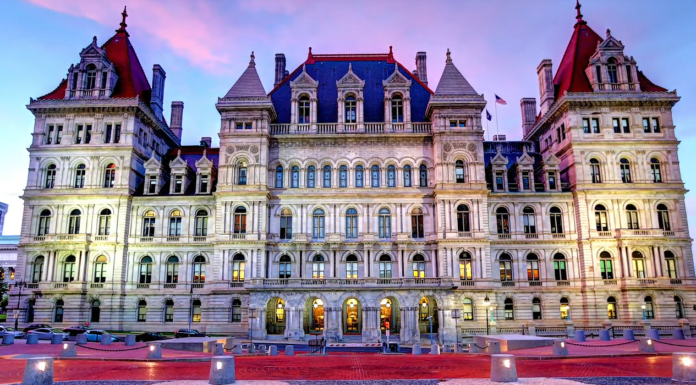(Headline USA) A New York appeals judge heard arguments Thursday over whether to continue blocking a lower court ruling that declared New York’s new congressional and legislative district maps unconstitutional.
New York’s electoral landscape was thrown into question last week when a judge deemed maps drawn by the state’s Democrat-controlled legislature to be blatantly gerrymandered and ordered then to redraw the district boundaries.
Despite having lost a seat due to residents fleeing radical leftist policies, New York lawmakers had attempted to double down by adding even more “safe” Democrat districts to the existing maps.
Democrats would make up a strong majority of registered voters in 22 of the 26 congressional districts the state will have in 2023.
Republicans, who now hold eight of New York’s 27 seats in Congress, would only have an advantage in four districts.
State Judge Patrick McAllister gave state officials only until April 11 to submit new maps, saying the districts they had drawn up had been illegally gerrymandered to favor Democrats.
The ruling came even as candidates have begun campaigning in the disputed districts in advance of a June party primary—and the Democrat-appointed appellate judge promptly allowed them to continue doing so, even with the case under review.
The radical lawmakers may be hoping to litigate it down to the wire, banking on the possibility that the Supreme Court may allow the maps to stand if the campaigns already have gone too far into the election season.
Justices John Roberts, Amy Coney Barrett and Brett Kavanaugh previously sided with the high court’s leftist voting bloc in parallel cases where activist judges had ordered maps to be redrawn by GOP-led legislatures in Pennsylvania and North Carolina on the basis that the primary campaigns arleady were underway.
After issuing a stay on McAllister’s ruling, New York Appellate Division Justice Stephen K. Lindley said he would decide after Thursday’s hearing whether to leave the stay in place for now, pending more legal action in the weeks ahead.
He could also lift the stay, which would put state lawmakers on an incredibly tight deadline to come up with new maps. Judge McAllister has said if lawmakers don’t meet his deadline, he would appoint his own expert to draw up new maps.
Thursday’s hearing likely won’t be the final word on the main issue: whether the new maps are so politically biased toward Democrats that they violate the state constitution.
The arguments are “just a skirmish along the way,” according to former U.S. Rep. John Faso, a Republican who has been helping muster support for the lawsuit challenging the maps’ legality.
A hearing for more arguments has already been scheduled for April 20.
Meanwhile, candidates faced a Thursday deadline to submit petition signatures they need to appear on the ballot in the primary.
Sen. Mike Gianaris, a Queens Democrat, said this week said he and the New York Legislative Task Force on Demographic Research and Reapportionment are not working on new maps.
“We are confident that we’ve drawn maps that will withstand scrutiny,” Gianaris said Tuesday on the news program Capital Tonight.
Democrats have argued, baselessly, that the new maps undo decades of gerrymandering by Senate Republicans, and that all maps reflect years of population loss in upstate communities once considered Republican strongholds.
Republicans, and some non-partisan voters rights groups, argue that Democrats went too far to create meandering Congressional districts that violate a a 2014 state constitutional amendment banning drawing maps “for the purpose of favoring or disfavoring incumbents or other particular candidates or political parties.”
In addition to Pennsylvania and North Carolina, courts have also intervened to block maps in GOP-led Ohio and Democrat-led Maryland.
In Ohio, state legislative races are delayed amid the legal fight since state hasn’t settled on of district boundaries long enough for them to be used for making ballots. The Republican-led Legislature has repeatedly approved maps that the Ohio Supreme Court has found unconstitutionally drawn to unduly favor Republicans.
And in Maryland, the Court of Appeals delayed the state’s primary for all elections from June 28 to July 19. New maps approved by Gov. Larry Hogan on Monday appeared to mitigate the Democrat legislature’s gerrymandering somewhat, although not entirely, according to GOP critics.
Adapted from reporting by the Associated Press

